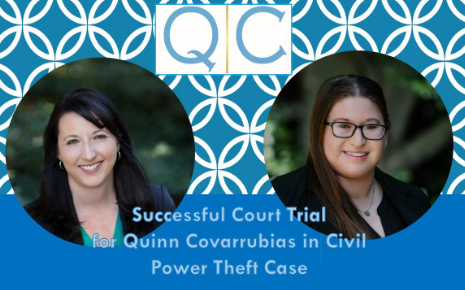On January 19, 2023, Stephanie L. Quinn and Monica A. Silver of Quinn Covarrubias received a judgment in favor of their client, Sacramento Municipal Utility District (SMUD), in a civil power theft case. SMUD alleged that the defendant diverted power at two residences in Sacramento County through an illegal bypass as part of a marijuana cultivation operation. The electricity supplied by SMUD was bypassed prior to being read by SMUD’s metering equipment.
After the theft was discovered at his rental property, the defendant dismantled the power theft operation at his residence, which was searched by local law enforcement authorities the next day. The defendant was the customer of record on the SMUD account for both properties and was billed for the unmetered electricity. The defendant admitted to the theft and was criminally prosecuted, but he claimed that he was only stealing power for a short period of time at both properties. For the residence where he removed the illegal electrical bypass, subpanel and marijuana cultivation prior to law enforcement’s search, he claimed he had only been stealing power for one small room, despite evidence that the operation was occurring throughout the residence.
SMUD brought suit under California Civil Code section 1882.1, a civil statute allowing utilities to recover for power theft “against a person who commits, authorizes, solicits, aids, abets, or attempts to (a) divert or cause to divert utility services, (b) either causes to make or makes a connection with property owned or used by the utility to provide utility service without the authorization or consent of the utility, (c) prevents a utility meter or other device which determines charges for utility service, from performing its function, (d) tampers with property owned or used by the utility to provide utility services, (e) uses or receives the direct benefit of the utility service with knowledge of or reason to believe the diversion, tampering, or unauthorized connection existed at the time.” SMUD also asserted causes of action for breach of contract, account stated, and conversion.
The case was tried over two days in front of a Sacramento Superior Court judge. In its statement of decision, the Court found that SMUD met its burden of proof to show that the defendant was diverting power at both residences for the time period SMUD presented in its case in chief. Relying on data analytics and eyewitness testimony, SMUD was able to demonstrate that the defendant’s claim that he was only stealing power for a short period of time was not credible.
The Court awarded treble damages on the civil power theft statute and also found that punitive damages were justified. Under the civil power theft statute, attorney’s fees and costs are also recoverable.

